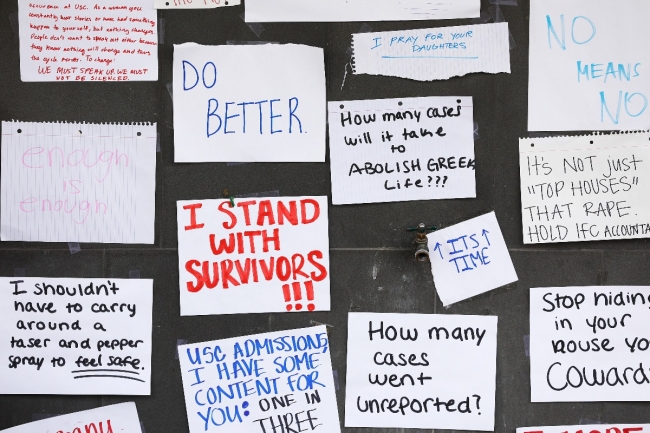You have /5 articles left.
Sign up for a free account or log in.

Students themselves are urging administrators to take action against sexual assault, staging protests at institutions across the country.
Al Seib/Los Angeles Times via Getty Images
The Association of American Universities announced Tuesday that it was adopting “groundbreaking” new principles for preventing sexual harassment in academe.
The presidents and chancellors of the AAU, an organization composed of 66 research universities across the U.S., voted during their fall meeting this week to adopt the eight new principles, which include fostering a climate and culture where sexual misconduct is unacceptable; sharing findings of sexual misconduct with prospective employers when requested; requiring job applicants to provide personnel information from their prior employers about sexual misconduct; holding students, faculty, administrators and staff accountable for violations; and completing all investigations into sexual misconduct.
“We know that this continues to be an issue on college campuses,” said Barbara Snyder, president of AAU. “And for that reason, we wanted collectively to speak to our members but also to say broadly to the higher ed community, obviously we think this is important. And we collectively believe that these principles will help guide our campuses.”
The principles are nonbinding and are meant to be adaptable for each institution’s cultural and legal context. Snyder said the principles seek to educate the campus community, ensure that sexual harassers don’t get passed from one institution to the next and provide victims with the resources to report abuse and hold perpetrators accountable.
The principles were first conceived in 2019 by AAU’s Advisory Board on Sexual Harassment in Academia, a group of 20 senior administrators and campus leaders convened to address sexual harassment and sexual misconduct within the organization’s member institutions. It is chaired by University of Southern California president Carol Folt and University of Kansas chancellor Douglas Girod.
Pedro Ribeiro, vice president for communications for AAU, said the full panel of chancellors and presidents unanimously approved the eight principles. Snyder noted that the principles could be amended, expanded or improved in the future with the consent of participating members.
“This unprecedented effort demonstrates the tremendous capacity for doing good that exists within AAU when member institutions work to address a systemic challenge,” Folt said in a statement. “I’m deeply thankful to my colleagues on the committee and my fellow presidents and chancellors for their work on adopting these principles.”
The principles were adopted while institutions are still in the “red zone” -- the time between the start of the school year and Thanksgiving break, when, statistically, 50 percent of all sexual assaults occur on campus and when first-year students are especially vulnerable. Because of the COVID-19 pandemic, some experts have called this year’s stretch a “double red zone,” since there are new classes of both sophomores and freshmen stepping onto campus. As a result, institutions are ramping up efforts to prevent sexual assault.
Tracey Vitchers, president of It’s On Us, an organization that works to combat campus sexual assault, said institutions need to commit to comprehensive prevention education if they’re going to foster a climate and culture where sexual misconduct is unacceptable.
“For AAU to come forward and say that it is the responsibility of their institutions to create a climate where sexual misconduct is unacceptable, that’s going to require AAU -- if they’re going to really enforce these principles -- to hold the institutions who are part of their network accountable for doing comprehensive prevention education,” Vitchers said.
Vitchers noted that some institutions haven’t done enough to educate new and returning students about sexual assault prevention this year. Students themselves are urging administrators to take action, staging protests at institutions including the University of Nebraska at Lincoln, Auburn University and the University of Kansas.
“When you look at the tone of the protests currently happening, students are truly demanding that schools do more than just provide survivors support,” Vitchers said. “It is unacceptable to students today that schools are simply taking the approach of reacting to sexual violence after it has occurred, rather than taking proactive steps to prevent it. And you’re seeing that in the protest signs and in the demands from students.”
Vitchers said institutions need to partner with nonprofits, including It’s On Us, to bring comprehensive prevention education to their campus communities in a way that is meaningful, impactful and community centered. Additionally, she said institutions should establish misconduct policies that enable the schools to remove perpetrators of sexual assault from campus, either temporarily through suspension or permanently through expulsion.
“Removing violent students is going to be a step that colleges are going to need to take if they’re actually going to say, ‘We are fostering the climate and culture where sexual misconduct is unacceptable’ and implement policies and practices that do actually support a harassment-free learning, living and working environment,” Vitchers said.




